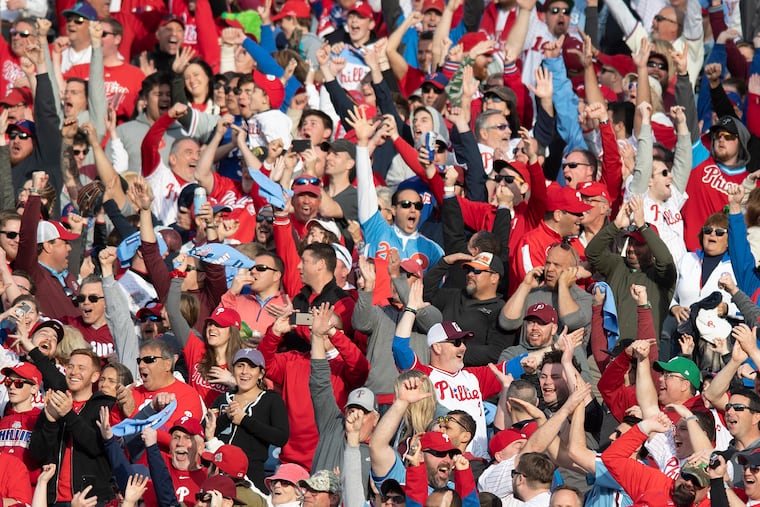The voice that launched the reputation of Philadelphia fans
Philly fans' reputation is the original sin, the innate blemish on all Philly sports fans. And the snake in the garden, the one to blame for our eternal taint, was a corpulent complainer named Pete Adelis.

No one could say for sure if there were two or 200 fans who booed Bryce Harper after his second strikeout in the Phillies’ Thursday opener. No one was certain whether that reaction was tongue-in-cheek or genuine.
All anyone did know was that the predictable response was coming – those cruel and fickle Philadelphians had done it again, turning on an athlete they’d stood and cheered for just two hours earlier.
That reputation is the original sin, the innate blemish on all Philly sports fans. And the snake in the garden, the one to blame for our eternal taint, was a corpulent complainer named Pete Adelis.
Philadelphia fans had always been loud and passionate, but so had those in Boston or New York. It wasn’t until Adelis put a face on our animus in the late 1940s that this city’s sports fans became a distinct and despised breed.
A lifelong South Philadelphian who worked for Gimbel’s and later the post office, “The Iron Lung of Shibe Park” was the prototype for how the rest of America saw the typical Philadelphia fan. Overweight, overwrought, outspoken and persistently negative, he gleefully beset professional athletes throughout the 1940s and 1950s.
According to Connie Mack biographer Norman Macht, opponents “dreaded playing at Shibe Park, where they had two hours or more of constant bellowing from one source.” And he didn’t spare the home teams.
Adelis might have been an off-putting presence at games before World War II, but it wasn’t until afterward that his reputation grew as large as his larynx. Sportswriters profiled him. The Yankees imported him for a vital doubleheader with Cleveland in 1948. The Phillies gave him a season pass to ensure the unease of their opponents.
“What made the players mad was his timing and the accuracy of his remarks,” one columnist wrote of Adelis, who thoroughly researched the lives of his targets. “He was an expert at needlework. He had finesse.”
Though he served for a time as a Shibe Park usher, he most frequently sat behind the visitors dugout. There, equipped with a grab-bag of noisemakers and a voice that could rattle the girders in the often near-empty ballpark, he relentlessly assaulted home and visiting players.
Bob Feller, Adelis claimed, was the easiest to rile. Ted Williams, Jackie Robinson and Eddie Mathews were among those who had to be restrained from going after him.
In 1948, the Sporting News asked Adelis for some guidelines that other ballpark loudmouths could follow. “Keep pouring it on” was one of his “Scientific Rules of Heckling.”
Adelis frequently ignored another of them, “Nothing purely personal.” He could be cruel, calling Joe DiMaggio “Garlic Breath” and Lou Boudreau “Marshmallow” and occasionally targeting a player’s marital or financial woes.
There’s no evidence to support the legend that the A’s paid him to berate Larry Doby, but whenever the American League’s first black came to bat, Adelis did pound a hammer on a Nazi helmet and scream, “Hey, Dopey!”
Shibe Park crowds tended to be small and Adelis’ booming voice ricocheted around the old park like mortar fire. He loved to target umpires (“blind chowderheads,” was a favorite epithet) and struggling pitchers, rising from his seat when they were yanked to bellow “I told you so!” Once he screamed “Walk ‘em, Walter!” nonstop for ten minutes as rattled Senators pitcher Walt Masterson issued six bases on balls.
He couldn’t be embarrassed. When the Yankees’ Joe Gordon turned at home plate and yelled, “Shut up, Whale Belly!” Adelis was delighted at the attention. And though he weighed 275 pounds, he often went shirtless on spring-training visits, prompting Bulletin columnist Hugh Brown to write, “the vast landscape he exposed was far from pretty.”
Once, umpire Larry Goetz halted a game for 15 minutes while he had Adelis, screaming all the way to the exit, ejected. Fans frequently grew so weary of his roaring voice that they bought him sodas and hot dogs hoping he’d shut up.
“I knew what they were up to,” Adelis said. “I yelled between bites.”
When the A’s left for Kansas City in 1954, Adelis went into a decline. He suffered a series of strokes in subsequent years and died at 62 in 1981, a year after the Phillies won their first World Series.
No one ever deciphered the real reasons for his behavior. They might have had some deep psychological roots. But Adelis didn’t think so.
“I’m quiet as a mouse all day at work,” Adelis, who eventually married in 1954, said several years earlier. “Most guys go home and holler at their wives. I’m single so I pick on ballplayers.”